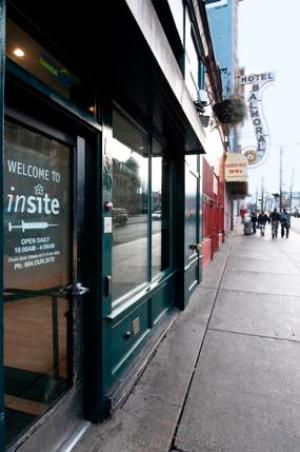With a decision Tuesday, the 3rd US Circuit Court of Appeals has brought to a screeching -- if hopefully temporary -- halt for efforts to establish a groundbreaking permitted safer injection facility in the city of Philadelphia. In the case of US v. Safehouse, the nonprofit group set to run the site, the court held that allowing the supervised onsite consumption of illegal drugs "will break the law" because it conflicts with a 35-year-old amendment to the Controlled Substances Act aimed at crack houses.

This is just the latest twist in the years-long effort to address an opioid overdose outbreak in the city that began about a decade ago, with overdose deaths nearly doubling between 2009 and 2018 and numbering more than a thousand a year every year since 2016. The crisis led to the formation of a Mayor's Task Force to Combat the Opioid Epidemic in Philadelphia, which issued a final report and recommendations in 2017 calling on the city to consider rolling out overdose prevention services, including safe injection sites, or, as Safehouse refers to them, overdose prevention sites.
Safehouse was formed to make that possibility a reality. Led by Jose A. Benitez, the executive director of the harm reduction group Prevention Point Philadelphia, Safehouse picked up a powerful ally in board member Ed Rendell, the former governor of the state and mayor and district attorney of Philadelphia. With Rendell's clout, the organization had overcome local obstacles and was preparing to open the first legal safe injection site in the country when Attorney General William Barr's Justice Department struck.
The US Attorney for the Eastern District of Pennsylvania filed a civil lawsuit in February 2019 asking a federal judge to find safe injection sites illegal under the Controlled Substance Act's "crack house" statute, throwing plans to open up into limbo. Eight months later, the court held that "the ultimate goal of Safehouse's proposed operation is to reduce drug use, not facilitate it, and accordingly, [the "crack house" statute] does not prohibit Safehouse's proposed conduct."
A February 2020 ruling from the same court reiterated the legality of safe injection sites in the Eastern District, but that summer, the judge ordered Safehouse to pause amidst the coronavirus pandemic and the police violence protests. Meanwhile, the US Attorney appealed the ruling that the proposed safe injection site was legal, with oral arguments held in November, and the 3rd Circuit's decision issued this week.
The Justice Department pronounced itself pleased.
"The Court's decision reaffirms that 'safe' injection sites are a violation of federal law," said Acting Attorney General Jeffrey A. Rosen in a statement. "The Department supports efforts to curb the opioid crisis ravaging this country, but injection sites are not the solution. There are more productive ways to address drug abuse, and today's ruling by the Third Circuit has confirmed that these sites are illegal and therefore not the answer."
"The rule of law is still alive and well in Philadelphia -- having been re-affirmed by the U.S. Court of Appeals for the Third Circuit, which held that it is a federal crime to open a heroin injection site or 'consumption room' for illegal drug use," added US Attorney for the Eastern District of Pennsylvania William M. McSwain. "The 3rd Circuit's opinion is a faithful reading of the statute's plain language and is consistent with Congress's intent to protect American neighborhoods from the scourge of concentrated drug use."
Reform advocates saw it quite differently.
"As the COVID-19 pandemic is exacerbating the already devastating overdose crisis, the Third Circuit's reversal of the earlier court's decision -- which held that safe consumption sites do not violate federal law -- will inevitably result in the unnecessary loss of countless lives," Lindsay LaSalle, managing director of policy for the Drug Policy Alliance (DPA), said in a statement. "The 3rd Circuit's decision is misguided -- it is abundantly clear that Congress never intended to criminalize legitimate public health interventions through [the 'crack house' statute]."
The 3rd Circuit's decision is precedential, meaning it holds throughout the district, which includes Delaware, New Jersey, Pennsylvania, and the US Virgin Islands. But other jurisdictions, such as San Francisco and New York City, where similar efforts are underway, are not bound by it, and DPA is encouraging groups pursuing such efforts to "continue to work toward authorization and implementation of supervised consumption sites to address the overdose crisis in their cities and states."
There may be help coming in the new Congress and Biden administration as well. Advocates say they will seek action in Congress to clarify that safer injection facilities should be permitted, and from the Biden Justice Department to provide guidance to US Attorneys to lay off on them.
This work by StoptheDrugWar.org is licensed under Creative Commons Attribution-ShareAlike 4.0 International
Comments
Government satirizes itself
"The 3rd Circuit's opinion is a faithful reading of the statute's plain language and is consistent with Congress's intent to protect American neighborhoods from the scourge of concentrated drug use."
Certainly Congress never intended any such thing, they only intended to win their next elections.
Why 'the media' doesn't report this 'fact' in every story they write confounds me.
Oh yea, they want the clicks.
'Alive and well' gets none. 'Dead' always attracts readers' interest.
As for hoping the Democrats will do better ... huh? Trump and Biden have always been super predators.
Add new comment